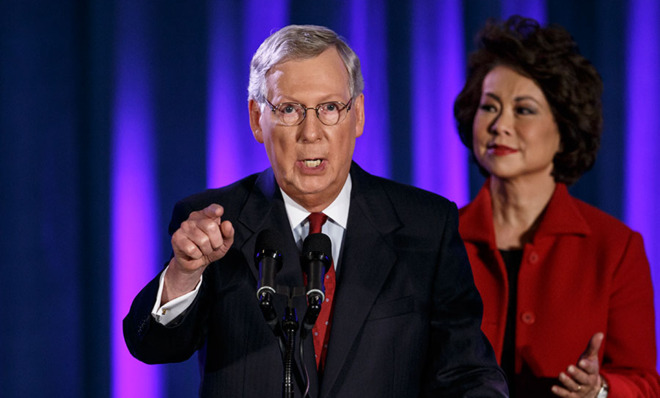How the GOP demolished Dems and seized the Senate
The GOP capped its years-long anti-Obama strategy with a huge prize: control of Congress


A free daily email with the biggest news stories of the day – and the best features from TheWeek.com
You are now subscribed
Your newsletter sign-up was successful
Mitch McConnell, who will soon be the next majority leader of the Senate, had a knife-twister of a line in his victory speech on Election Night, telling his supporters, "Just because we have a two-party system doesn't mean we have to be in perpetual conflict."
The irony was not lost on political observers, who have put McConnell on a pedestal for devising the strategy of total obstruction that ensnared Congress in gridlock, helped erode President Obama's approval ratings, and ultimately allowed Republicans to reclaim control of Congress. It began with a Tea Party–inspired takeover of the House in 2010, and culminated tonight with a rout of vulnerable Democrats in the Senate.
Democrats lost seats in Arkansas, South Dakota, West Virginia, Montana, Colorado, North Carolina, and Iowa. They barely held on to what had previously been seen as a safe seat in Virginia. They failed to knock off any vulnerable Republican incumbents, including Kansas' Pat Roberts and McConnell himself. And they were unable to take down two juicy gubernatorial targets, Rick Scott of Florida and Scott Walker of Wisconsin.
The Week
Escape your echo chamber. Get the facts behind the news, plus analysis from multiple perspectives.

Sign up for The Week's Free Newsletters
From our morning news briefing to a weekly Good News Newsletter, get the best of The Week delivered directly to your inbox.
From our morning news briefing to a weekly Good News Newsletter, get the best of The Week delivered directly to your inbox.
There was no dominant theme to these midterms. But Republicans across the country were able to lasso their opponents to Obama as his approval ratings fell, in what became a vote of general dissatisfaction with his handling of the economy, foreign policy, health care, and other issues.
This will be the second wave election of his presidency, remarkable given how easily he won election and re-election. It is evidence that Obama fatigue has crept into the coalition that buoyed his presidential campaign, but declined to show up at the polls for his fellow Democrats in off-election years.
It remains to be seen whether McConnell and Co. will devise a new strategy once Congress begins a new session. He is already facing enormous pressure from the conservative base to remain on offense against Obama, which could include hearings, debt showdowns, and votes to repeal ObamaCare. But along with Speaker John Boehner, McConnell will be in charge of setting the table for the 2016 presidential election, which may entail pursuing compromises that could make further inroads with the Obama coalition.
And remember, McConnell's grand strategy has had its downsides, too — most notably a low favorability rating for the GOP that could come back to haunt the party long after the glow of tonight's victory fades.
A free daily email with the biggest news stories of the day – and the best features from TheWeek.com
Ryu Spaeth is deputy editor at TheWeek.com. Follow him on Twitter.